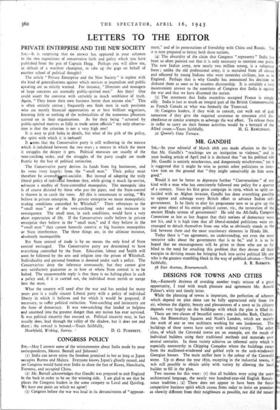LETTERS TO THE EDITOR
PRIVATE ENTERPRISE AND THE NEW SOCIETY Six,-It is surprising that no answer has appeared in your columns to the two expositions of conservative faith and policy which you have published from the pen of Captain Hogg. Perhaps you will allow me, in default of a worthier champion, to take up the gage on behalf of another school of political thought?
The article " Private Enterprise and the New Society " is replete with the kind of generalisations against which novices at journalism and public speaking are so strictly warned. For instance, " Directors and managers of large concerns are normally public-spirited men." Are they? One could assert the converse with certainly as much semblance of truth. Again, " They know their own business better than anyone else." This is often entirely untrue ; frequently one finds men in such positions who are merely financial -opportunists or at best brilliant or&anisers, knowing little or nothing of the technicalities of the numerous processes carried on in their organisations. As for their being " actuated by public-spirited motives as fully as trade union officials " my only observa- tion is that the criterion is not a very high one!
It is easy to pick holes in details, but what of the pith of the policy, the spirit with which it is imbued?
It teems that the Conservative party is still wallowing in the morass which it .inhabited between the two wars ; a morass in which the more it struggles the deeper it gets. Political morasses are usually of the vote-catching order, and the struggles of the party caught are made frantic by the fear of political extinction.
The Conservative party derives its funds from big businesses, and its votes (very largely) from the " small man." Their policy must therefore be avowedlyonti-socialist. But instead of adopting the truly liberal policy of indivi al freedom they, while giving it much lip-service, advocate a medley of State-controlled monopolies. The monopoly idea Is of course dictated by those who pay the piper, and the State-control is thrown in to catch the votes. All this is tantamount to saying, " We believe in private enterprise. By private enterprise we mean monopolistic trading conditions controlled by Whitehall." Their references to the " small man " are of the vote-catching order and are insincere in consequence. The small man, in such conditions, would have a very short expectation of life. If the Conservatives really believe in private enterprise they believe in the " small man," and if they believe in the "small man " they cannot honestly connive at big business monopolies or State interference. The three things are, in the ultimate instance, absolutely incompatible.
But State control of trade is by no means the only kind of State control envisaged. The Conservative party are determined to have everything controlled by the State. Education, labour and tealth will soon be followed by the arts and religion into the prison of Whitehall. Individuality and personal freedom is doomed under such a policy. The Conservatives deny the inference strenuously, but they cannot give any satisfactory guarantee as to how or where State control is to be halted. The unanswerable reply is that there is no halting-place in such • policy and, if it is carried out, the individual must perish or merge into the mass.
What the country will need after the war and has needed for many years past is a really sincere Liberal party with a policy of individual liberty in which it believes and for which it would be prepared, if necessary, to suffer political extinction. Vote-catching and insincerity are the bane of democracy. It was vote-catching that landed us helpless and unarmed into the greatest danger than any nation has ever survived. It was political sincerity that rescued us. Political sincerity may, in fact usually does, lead through the valley of the shadow, but it does not end there ; the reward is beyond.—Yours faithfully,


























 Previous page
Previous page